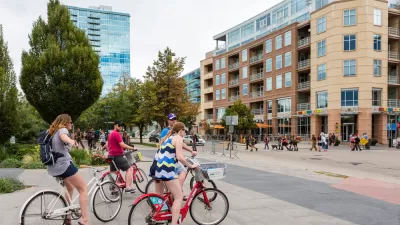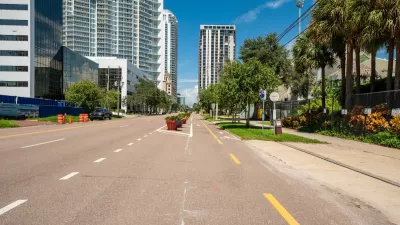Of the 7.3 billion people living on the planet, one in every 12 owns a bike. Despite appearances, however, that number has not increased much in recent years.
Ari Phillips reports on a new study in the Journal of Transport & Health that finds "global bicycle ownership has significantly fallen in the past three decades."
"Published in the Journal of Transport & Health, researchers from Johns Hopkins University analyzed data from 1.25 billion households in what they consider to be the the [sic] first global study of bicycle ownership over time. They found that the number of bike owners, while increasing or holding steady in some countries, has plummeted in others," explains Phillips.
Phillips spoke with the lead author of the story, Olufolajimi Oke, who hopes that the finds of the study will help policymakers find ways to get more traction for cycling. In a surprising finding couched in the otherwise distressing news for biking advocates, the United States has actually led the recent resurgence in the popularity of bikes in the past five years. Still, the percentage of Americans riding a bike for their commute hasn't changed much in the past decade.
The article includes more geographic detail about the findings of the study as well as some speculation on what the data means for the societies driving the numbers.
FULL STORY: Since the start of the millennial generation, bicycle ownership has screeched to a halt

Alabama: Trump Terminates Settlements for Black Communities Harmed By Raw Sewage
Trump deemed the landmark civil rights agreement “illegal DEI and environmental justice policy.”

Planetizen Federal Action Tracker
A weekly monitor of how Trump’s orders and actions are impacting planners and planning in America.

The 120 Year Old Tiny Home Villages That Sheltered San Francisco’s Earthquake Refugees
More than a century ago, San Francisco mobilized to house thousands of residents displaced by the 1906 earthquake. Could their strategy offer a model for the present?

In Both Crashes and Crime, Public Transportation is Far Safer than Driving
Contrary to popular assumptions, public transportation has far lower crash and crime rates than automobile travel. For safer communities, improve and encourage transit travel.

Report: Zoning Reforms Should Complement Nashville’s Ambitious Transit Plan
Without reform, restrictive zoning codes will limit the impact of the city’s planned transit expansion and could exclude some of the residents who depend on transit the most.

Judge Orders Release of Frozen IRA, IIJA Funding
The decision is a victory for environmental groups who charged that freezing funds for critical infrastructure and disaster response programs caused “real and irreparable harm” to communities.
Urban Design for Planners 1: Software Tools
This six-course series explores essential urban design concepts using open source software and equips planners with the tools they need to participate fully in the urban design process.
Planning for Universal Design
Learn the tools for implementing Universal Design in planning regulations.
Clanton & Associates, Inc.
Jessamine County Fiscal Court
Institute for Housing and Urban Development Studies (IHS)
City of Grandview
Harvard GSD Executive Education
Toledo-Lucas County Plan Commissions
Salt Lake City
NYU Wagner Graduate School of Public Service





























